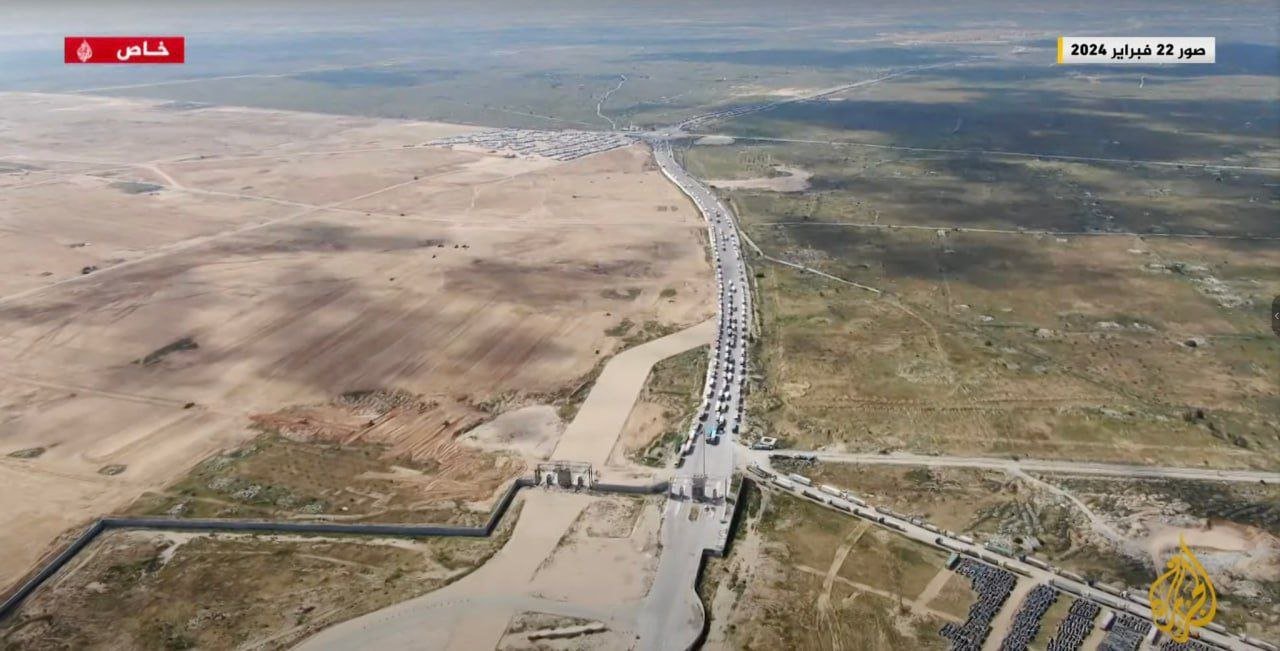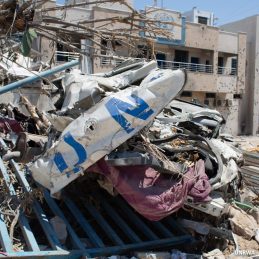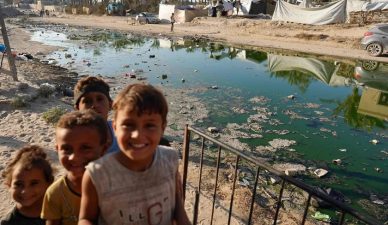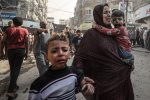GAZA, (PIC)
The specter of famine looms over various parts of the Gaza Strip, where around 2.2 million people are suffering from severe shortages of food, medicine, and even shelter. Meanwhile, Al Jazeera reports the piling up of aid trucks on the other side of the Rafah crossing.
In the northern part of the Strip, signs of severe food shortages are increasing in the areas besieged by the occupying forces.
Scenes aired by Al Jazeera show displaced people crowded in long queues, seeking to satisfy their hunger despite limited resources and a severe shortage of basic food supplies, which warns of an impending famine, according to international humanitarian organizations.
Truck congestion is evident, and aerial images of the Rafah crossing obtained by Al Jazeera on February 22nd show hundreds of trucks piled up at the crossing, while around 2.2 million people are at risk of severe hunger.
The humanitarian situation in the Gaza Strip continues to deteriorate, with the vast majority of its residents now facing the threat of collective famine, according to the United Nations.
The entry of aid into Gaza is subject to Israel’s approval, and the meager humanitarian support primarily reaches the Strip through the Rafah crossing with Egypt, but its transfer to the north is fraught with risks due to destruction and fighting.
In Jabalia, in the northern area of the Strip, video footage showed dozens of people pushing and shoving, holding empty containers to get food. Amidst the chaos, a man who appeared to be in charge of distributing soup shouted, “There’s no soup left.” calling for an end to the pushing and shoving. One of the onlookers shouted, “Let the whole world see where we have reached and what has befallen us.”
In another scene, dozens of protesters gathered to denounce the shortage of food supplies, including children who carried signs that read, “Our children are dying of hunger, Deliver aid to North Gaza, and No to the policy of starvation.”
Many people from the northern part of the Gaza Strip have been displaced to the central areas. Among them is Samir Abdul Rabeh, who arrived from Jabalia to Nuseirat on Sunday morning, displaced due to hunger with his wife and his 18 months old daughter.
He told the French Press Agency, “I walked on foot from North Gaza, I cannot describe the level of famine there, I have a young daughter who is one and a half years old, and there is no milk. I am trying to feed her with the bread I make from leftover animal feed and corn. She cannot digest it, there is no relief. Our only hope is in Allah.”
International warnings
Save the Children organization has warned that the risk of famine is expected to increase as long as the Israeli government continues to obstruct the entry of aid into Gaza.
Adriana Zigha, the media and communications officer at Oxfam, stated that the daily rate of aid trucks entering the Gaza Strip is insufficient.
She added to Al Jazeera, “We are waiting to receive 3,000 boxes of health supplies to be delivered to Gaza.”
On the other hand, the media advisor for the United Nations Relief and Works Agency for Palestine Refugees (UNRWA) stated that Israel is attempting to get rid of the agency in order to settle the issue of Palestinian refugees.
The media advisor, in statements to Al Jazeera, said that UNRWA teams have attempted to bring aid trucks into North Gaza several times, but they have been prevented from doing so by Israel.
Two days ago, the United Nations warned that Israeli restrictions on essential services and humanitarian aid in Gaza are leading to increased concerns about famine, thirst, and disease.
The report stated that the siege imposed on Gaza may amount to collective punishment, and the use of starvation as a means of warfare is considered a war crime.
Since October 7, 2023, Israel, which is facing trial before the International Criminal Court on charges of committing genocide against Palestinians, has been waging a devastating war on Gaza, resulting in 29,692 deaths and 69,879 injuries, mostly children and women, in addition to thousands of missing people under the rubble, according to Palestinian authorities.
The United Nations classified the first 100 days of the war on Gaza as the bloodiest of the 21st century.















